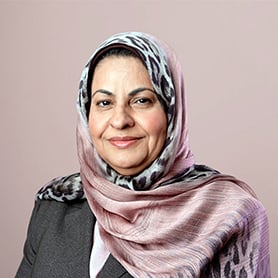Sara Akbar: From the Oil Fields to the Frontlines of Change
Born and raised on the oil fields of Kuwait, Sara Akbar’s extraordinary rise to become one of the first female CEOs in the Arabian energy sector is a compelling story of grit, determination, and unshakable purpose. Navigating a traditionally male-dominated industry, Sara has broken barriers not just for herself, but for countless women aspiring to lead in energy and beyond. Her journey is rooted in a deep sense of national pride and an unrelenting drive to create impact—from mentoring the next generation of talent to redefining what leadership looks like in the modern Middle East. With candid insights on courage, transparency, and purpose-driven leadership, Sara is not only shaping the future of energy but also inspiring a more inclusive, empowered path forward for women in business.


Sara Akbar
Chairperson & Chief Executive Officer
at Oilserv Kuwait
Q.
Looking at your career progression, how have your early experiences shaped your career trajectory and what do you think the oil and gas industry has to offer other career-minded professionals?
I was born in a small hospital based on a Kuwaiti oil field, so during my childhood the refinery was my playground. Along with my siblings, I wandered freely around the oil fields and would sometimes be offered tea and biscuits in the control room. I watched in fascination at the huge flames of the gas flaring and would listen to its roar. While I didn’t understand at the time how the oil fields worked, it felt a totally normal progression for me to come back and work in the industry as an engineer. It’s where I find peace and am happiest. The most satisfying part of my job is still to wander around the fields and meet with people as they work.
Of course, not many people are as lucky to have been raised in an environment that allows you to develop a love for an industry. However, others can do this by focusing on a sector or role that feels normal and natural to them. I also think we are sometimes too quick to judge an industry in terms of what it can offer so it’s important to explore all the options. I would suspect, for example, that many people would assume the oil and gas sector is mainly about being a chemical petroleum engineer. But it has so much more to offer as it’s also an industry that has to be at the cutting edge of technology and implement best operational practices in health and safety.
Also, sustainability expertise and skills are increasingly required. While the industry recognises it doesn’t have a great environmental reputation, it aims to improve and it needs leaders who can work on innovative solutions to enhance the sector’s ability to capture pollutants. So, I’d recommend that anyone searching for a rewarding career considers the oil and gas industry.
Q.
You’ve been described as a national hero for your achievements in controlling the oil fires following the 1990 invasion. You are also one of the first women CEOs in the Arabian oil sector, an advocate for women’s rights, and in 2017, you were named one of the top 100 most powerful Arab businesswomen. What drives you forward, and what can other women learn from your approach?
Being a woman in a male-dominated business meant I had to go the extra mile. So initially I worked hard and long hours to prove myself. Then I realised that I didn’t have to prove anything to anybody. I got to where I was because I wanted to do the best thing for the company, the industry and for a better Kuwait. This is what still drives me today.
I also learned quickly that developing the building blocks to improve technical knowledge is extremely important. This goes beyond studying, which for me was petroleum engineering, but means going out of your comfort zone to learn more and connect with the wider community in your industry. This was more difficult in the 1980s without internet connectivity, so I invested in myself by paying for subscriptions to join and attend as many technical societies and conferences as possible to learn as much as I could. Not only was it very rewarding, but I now sit on the boards of many of those societies where I’m connected to the best minds and talents in the industry.
It’s also important not to limit yourself. We live in a changing world, and what happens in other industries will likely impact your business. You can’t risk falling behind, particularly where new technology is involved. I bought my own pre-internet computer, taught myself Excel, and started creating reports because I could see that this was the way forward. It’s important to embrace change and see how it applies to your own industry. So you have to keep your eyes open to everything that goes on around you to be able to integrate best ideas and practices from other sectors into your own industry. This ability to improve how things work by pulling on different tools and practices in life is a skill women are very good at.
Q.
You’ve demonstrated that you are not afraid to roll up your sleeves and get the job done. As a leader who has also run your own oil company, how can you ensure all the moving parts of the business - safety, risk management, operations - grow and develop to achieve long-term success?
As you progress in your career, you can learn a lot from watching management, particularly when new ideas emerge. Embracing new ideas can be a breath of fresh air. In my case, pivoting away from a classic management style opened the door to a more people and performance-oriented approach that really enhanced the company’s working practices, creating new processes that were far more efficient and delivered much better results.
I took a lot of these principles with me when I started my own company. In particular, I learnt the importance of truth, openness and transparency when dealing with people across the business. When you explain actions clearly, it simplifies life as everyone knows the reasons behind why things are happening. As a result, employees are happier, tend to come up with more ideas, and are more efficient and loyal. Creating such transparency is perhaps the most rewarding element of running a business and is a far more productive approach than receiving instructions from top management that often make little sense. Too few companies see the value in this approach. But I believe it should be a top priority.
“When you explain actions clearly, it simplifies life... as a result, employees are happier, tend to come up with more ideas, and are more efficient and loyal.”
– Sara Akbar, Chairperson & Chief Executive Officer at Oilserv Kuwait
Q.
How can today’s business leaders best meet today’s challenges in the oil industry, and where does sustainability feature as a business driver?
I think today’s oil industry leaders are on a challenging pathway as we find ourselves in a new world disorder. One that features increasing geopolitical tensions and trade wars that will impact the industry. We live in a more fragmented world, which goes against the many years of effort we put in to globalise the industry.
As a result, I think trying to forecast and implement a strategy when the outcome is so unclear is going to be very tough. As we move into a more competitive, fractious and less collaborative business landscape, I fear every industry will lose out. The only way to handle it is to develop various scenarios and manage them accordingly as each sequence of events plays out.
The good news on sustainability is that while the US retracts from many of the environmental and emissions regulations, Europe and the rest of the world are not. So, the oil and gas industry will continue with ongoing plans to curb emissions. While actions may not progress as quickly as hoped, sustainability plans remain important. At the end of the day, this is our only planet, so we have to put in a major effort to make it better.
Oil companies have perhaps learned the hard way after a long period of denial that we can be part of the solution. So, we need to continue with environmental and social responsibility plans, which is now embedded in every company as part of a strategic and long-term outlook.
Q.
Finally, is there an initiative or action that you have taken in your career that’s made a difference you’re most proud of, and what would you say to encourage more women into the sector?
One initiative I’m particularly proud of is, as CEO of Kuwait Energy, I devised a programme to develop the potential of young people. Every year, I nominated a young person within the company to be the chief of staff in my office. The programme gave that person access to my emails and contacts. They would also travel with me to attend meetings and were responsible for making 50% of my decisions. Such access to top management and levels of responsibility is unparalleled and helped to jump-start their careers. Almost 12 young men and women have gone through the programme, which has been a powerful tool to develop talent and loyalty. It has also been personally enriching, as I enjoy training and teaching. It’s all part of giving back to an industry I love.
The second initiative I’m very proud of is developing relations between Iraq and Egypt in 2014/15 when Iraq was almost isolated from the rest of the Arab world. I believed that creating a dialogue between the two countries was a pathway to growing the private sector and forging stronger relationships with other countries. One of the first actions I took as CEO of Kuwait Energy was to develop relations between Iraq and Egypt by bringing assets to the table and opening the door to facilities in Iraq to Egyptian General Petroleum Corporation (EGPC) and Petrojet. Now, 10 years later, those assets are still performing well, and I feel very proud I was instrumental in developing those relationships.
“I’m often asked wouldn’t it be better for me to have a desk job rather than wearing a Hijab in the oil fields? My response is always the same: my Hijab is covering my hair, not my brain.”
– Sara Akbar, Chairperson & Chief Executive Officer at Oilserv Kuwait
You need to think big. It’s only by improving for the benefit of the industry and country that we can really make a difference. We have the power to change and improve lives, and women looking to work in the sector should not be intimidated by how others perceive us. I’m often asked wouldn’t it be better for me to have a desk job rather than wearing a Hijab in the oil fields? My response is always the same: my Hijab is covering my hair, not my brain. Being good at my job doesn’t rely on how I look; it’s how my brain works, and it’s doing just fine.
I would encourage all women to go for it, regardless of how they look and what they wear. Never stop believing you can do the job as good as, or better than, others. Always push forward because it’s only through insistence, resilience and being adamant that will get you to where you want to be.
And finally, collaboration and alignment. It is crucial to bring teams across markets together to uphold shared values and deliver a unified approach, while still respecting and adapting to local market dynamics.